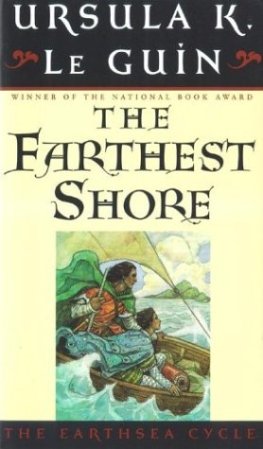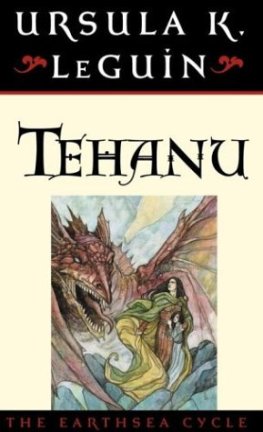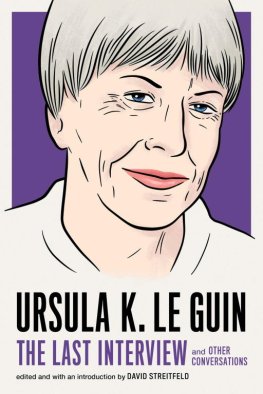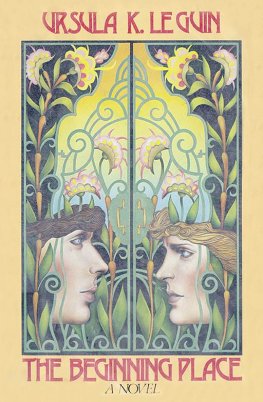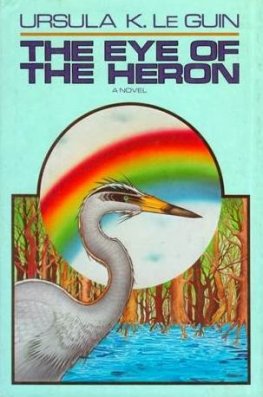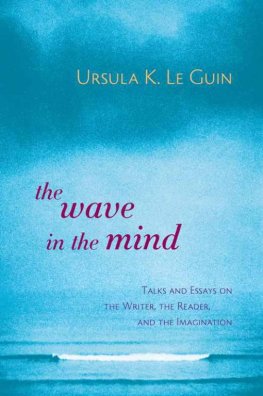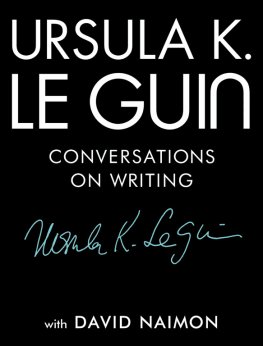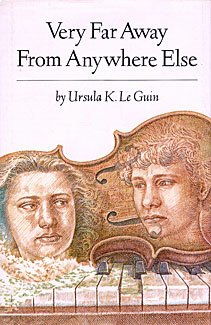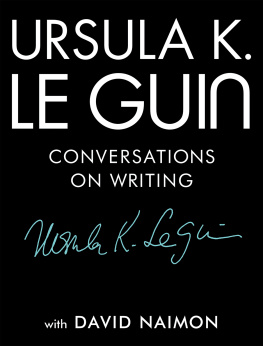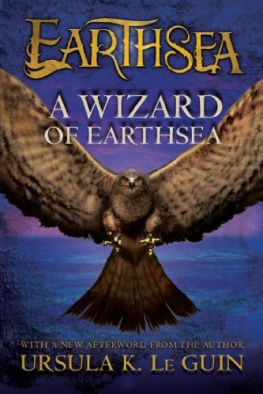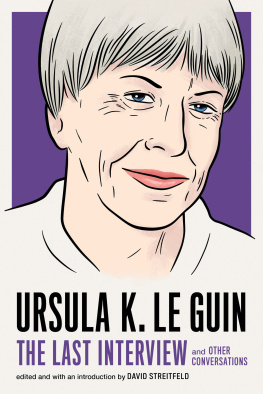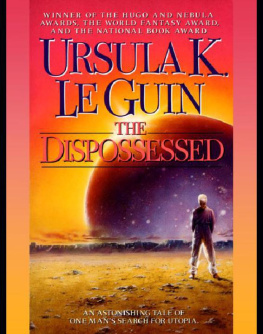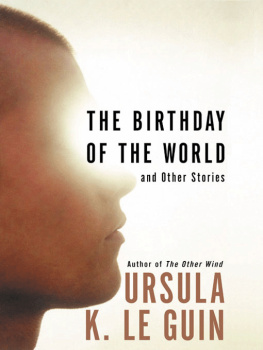Ursula Le Guin - Unlocking The Air
Here you can read online Ursula Le Guin - Unlocking The Air full text of the book (entire story) in english for free. Download pdf and epub, get meaning, cover and reviews about this ebook. genre: Science fiction. Description of the work, (preface) as well as reviews are available. Best literature library LitArk.com created for fans of good reading and offers a wide selection of genres:
Romance novel
Science fiction
Adventure
Detective
Science
History
Home and family
Prose
Art
Politics
Computer
Non-fiction
Religion
Business
Children
Humor
Choose a favorite category and find really read worthwhile books. Enjoy immersion in the world of imagination, feel the emotions of the characters or learn something new for yourself, make an fascinating discovery.

- Book:Unlocking The Air
- Author:
- Genre:
- Rating:5 / 5
- Favourites:Add to favourites
- Your mark:
- 100
- 1
- 2
- 3
- 4
- 5
Unlocking The Air: summary, description and annotation
We offer to read an annotation, description, summary or preface (depends on what the author of the book "Unlocking The Air" wrote himself). If you haven't found the necessary information about the book — write in the comments, we will try to find it.
Unlocking The Air — read online for free the complete book (whole text) full work
Below is the text of the book, divided by pages. System saving the place of the last page read, allows you to conveniently read the book "Unlocking The Air" online for free, without having to search again every time where you left off. Put a bookmark, and you can go to the page where you finished reading at any time.
Font size:
Interval:
Bookmark:
Ursula K. Le Guin - Unlocking The Air
Unlocking The Air
People stand in the lightly falling snow. Something is shining, trembling, making a silvery sound. Eyes are shining. Voices sing. People laugh and weep, clasp one anothers hands, embrace.
Something shines and trembles. They live happily ever after. The snow falls on the roofs and blows across the parks, the squares, the river.
This is history.Once upon a time, a good king lived in his palace in a kingdom far away. But an evil enchantment fell upon that land. The wheat withered in the ear, the leaves dropped from the trees of the forest and nothing thrived.
This is a stone.Its a paving stone of a square that slants downhill in front of an old, reddish, almost windowless fortress called the Roukh Palace. The square was paved nearly 300 years ago, so a lot of feet have walked on this stone, bare feet and shod, childrens little pads, horses iron shoes, soldiers boots; and wheels have gone over and over it, cart wheels, carriage wheels, car tires, tank treads. Dogs paws every now and then. There has been dogshit on it, there has been blood, both soon washed away by water sloshed from buckets or run from hoses or dropped from the clouds. You cant get blood from a stone, they say, nor can you give it to a stone; it takes no stain. Some of the pavement, down near that street that leads out of Roukh Square through the old Jewish quarter to the river, got dug up, once or twice, and piled into a barricade, and some of the stones even found themselves flying through the air, but not for long. They were soon put back in their place, or replaced by others. It made no difference to them. The man hit by the flying stone dropped down like a stone beside the stone that had killed him. The man shot through the brain fell down and his blood ran out on this stone, or another one maybe; it makes no difference to them. The soldiers washed his blood away with water sloshed from buckets, the buckets their horses drank from. The rain fell after a while. The snow fell. Bells rang the hours, the Christmases, the New Years. A tank stopped with its treads on this stone. Youd think that that would leave a mark, a huge heavy thing like a tank, but the stone shows nothing. Only all the feet bare and shod over the centuries have worn a quality into it, not a smoothness, exactly, but a kind of softness, like leather or like skin. Unstained, unmarked, indifferent, it does have that quality of having been worn for a long time by life. So it is a stone of power, and who sets foot on it may be transformed.
This is a story.This is a story. She let herself in with her key and called, "Mama? Its me, Fana!"
And her mother, in the kitchen of the apartment, called, "Im in here," and they met and hugged in the doorway of the kitchen.
"Come on, come on!"
"Come where?"
"Its Thursday, Mama!"
"Oh," said Bruna Fabbre, retreating toward the stove, making vague protective gestures at the saucepans, the dishcloths, the spoons.
"You said."
"But its nearly four already "
"We can be back by six-thirty."
"I have all the papers to read for the advancement tests."
"You have to come, Mama. You do. Youll see!"
A heart of stone might resist the shining eyes, the coaxing, the bossiness. "Come on` she said, and the mother came. But grumbling. "This is for you," she said on the stairs. On the bus, she said it again. "This is for you. Not me. "What makes you think that?"
Bruna did not reply for a while, looking out the bus window at the gray city lurching by, the dead November sky behind the roofs.
"Well, you see," she said, "before Kasi, my brother Kasimir, before he was killed, that was the time that would have been for me. But I was too young. Too stupid. And then they killed Kasi."
"By mistake."
"It wasnt a mistake. They were hunting for a man whod been getting people out across the border, and theyd missed him. So it was to..."
"To have something to report to the Central Office." Bruna nodded. "He was about the age you are now," she said. The bus stopped, people climbed on, crowding the aisle. "Since then, twenty-seven years, always since then, its been too late. For me. First too stupid, then too late. This time is for you. I missed mine."
"Youll see," Stefana said. "Theres enough time to go round."
This is history.This is history. Soldiers stand in a row before the reddish, almost windowless palace; their muskets are at the ready. Young men walk across the stones toward them, singing, "Beyond this darkness is the light, 0 Liberty, of thine eternal day!" The soldiers fire their guns. The young men live happily ever after.
This is biology.
"Where the hell is everybody?"
"Its Thursday," Stefan Fabbre said, adding, "Damn!" as the figures on the computer screen jumped and flickered. He was wearing his topcoat over sweater and scarf, since the biology laboratory was heated only by a space heater that shorted out the computer circuit if they were on at the same time.
"There are programs that could do this in two seconds," he said, jabbing morosely at the keyboard. Avelin came up and glanced at the screen. "What is it?"
"The RNA comparison count. I could do it faster on my fingers." Avelin, a bald, spruce, pale, dark-eyed man of 40, roamed the laboratory, looked restlessly through a folder of reports. "Cant run a university with this going on," he said. "Id have thought youd be down there." Fabbre entered a new set of figures and said, "Why?"
"Youre an idealist."
"Am l?" Fabbre leaned back, rolled his head to get the cricks out. "I try hard not to be," he said.
"Realists are born, not made." The younger man sat down on a lab stool and stared at the scarred, stained counter. "Its coming apart," he said.
"You think so? Seriously?" Avelin nodded. "You heard that report from Prague." Fabbre nodded.
"Last week... this week... next year yes. An earthquake. The stones come apart it falls apart there was a building, now theres not. History is made. So, I dont understand why youre here, not there."
"Seriously, you dont understand?" Avelin smiled and said, "Seriously."
"All right." Fabbre stood up and began walking up and down the long room as he spoke. He was a slight gray-haired man with youthfully intense, controlled movements. "Science or political activity, either/or: Choose. Right? Choice is responsibility, right? So I chose my responsibility responsibly. I chose science and abjured all action but the acts of science. The acts of a responsible science. Out there, they can change the rules; in here, they cant change the rules; when they try to, I resist. This is my resistance." He slapped the laboratory bench as he turned round. "Im lecturing. I walk up and down like this when I lecture. So. Background of the choice. Im from the northeast. Fifty-six, in the northeast, do you remember? My grandfather, my father-reprisals. So, in Sixty, I come here, to the university. Sixty-two, my best friend, my wifes brother. We were walking through a village market, talking, then he stopped, he stopped talking, they had shot him. A kind of mistake. Right? He was a musician. A realist. I felt that I owed it to him, that I owed it to them, you see, to live carefully, with responsibility, to do the best I could do. The best I could do was this," and he gestured around the laboratory. "Im good at it. So I go on trying to be a realist. As far as possible, under the circumstances, which have less and less to do with reality. But they are only circumstances. Circumstances in which I do my work as carefully as I can."
Avelin sat on the lab stool, his head bowed. When Fabbre was done, he nodded. After a while, he said, "But I have to ask you if its realistic to separate the circumstances, as you put it, from the work."
"About as realistic as separating the body from the mind," Fabbre said. He stretched again and reseated himself at the computer. "I want to get this series in," he said, and his hands went to the keyboard and his gaze to the notes he was copying. After five or six minutes, he started the printer and spoke without turning. "Youre serious, Givan? You think its coming apart?"
Font size:
Interval:
Bookmark:
Similar books «Unlocking The Air»
Look at similar books to Unlocking The Air. We have selected literature similar in name and meaning in the hope of providing readers with more options to find new, interesting, not yet read works.
Discussion, reviews of the book Unlocking The Air and just readers' own opinions. Leave your comments, write what you think about the work, its meaning or the main characters. Specify what exactly you liked and what you didn't like, and why you think so.

